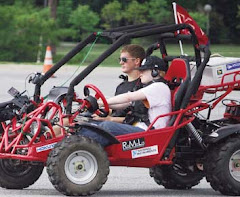The following is my June, 2010 column From Where I Sit for Voices of Central Pennsylvania:
“Are you really my son?” my 84-year-old mother, who suffers from dementia, asks. Six weeks ago my mother, Dr. Miriam Pell Schmerler, stopped answering the telephone by herself. Our weekly calls were models of the bizarre, with my combining Hebrew and English into the conversation, knowing that hearing my name in Hebrew sparked recognition not otherwise available. The once a week calls followed a pattern. I would tell her that I was her son. “Really?” she said, “how nice.” Then we would talk about some aspect of her life: her career including a doctorate in Hebrew letters (received in
her late 50s) from the Jewish Theological Seminary.
In our calls I repeatedly identified everyone, Mother’s daughter, grandchildren, and husbands. “You know you were married three times.” “Three times,” she said “that’s a lot, isn’t it?” I then described each of her husbands, including my father who was 27 years older than she. “Isn’t that a big difference in age?” she asked. The ongoing saga of her life amused her. It filled me with a tenderness for my mother I do not recall ever having felt. I remember a Buddhist minister saying that he had “issues” with his
mother. The word “issues” seems so refined and polite that I adopted the word instantly. During our conversations, the issues disappeared. My cousin Michael once commented about how witty and charming my mother is. I said I had never observed it. Michael said, “Of course not. She is your mother.
She cannot allow herself to be witty and charming in front of you.”
Now that she did not recognize me, other than as a friendly caller telling stories about her life,
my mother became a real person for me. My children, Joanna and Amelia, found distress in mother’s
inability to recognize her grandchildren. While I tried to explain my perspective, I could not alleviate their distress.
Nor could I alleviate my own distress in mid-March when I called Mother and she did not answer the phone. I began a new routine, calling the staff at the excellent nursing home and asking Jackie, Brooke,
Marina, Mary Anne or Kim to go to mother’s room and hand the ringing phone to Miriam. My mother’s voice conveyed a sense of confusion and distress. The conversation was largely gibberish. It became
clear that I had to see her. But how?
The answer is circuitous. My 1993 Buick was broken. I entrusted it to Gary D. Green’s College Heights Exxon, a wonderfully reliable institution. My mechanic Jeff told me he needed more time to figure out what was wrong. Nevertheless, I needed to go to Altoona, headquarters of the Blair/Clearfield Association for the Blind and Visually Impaired, for which I work.
I researched bus service to Altoona which would take me downtown (and my power chair has enough battery power to take me to and from the office), but I could not get to a safe accessible motel where I planned to stay the week. There is no train.
I had heard about a disability van service called Wheelchair Getaways. After talking to Shannon Markley, I decided to pay for the incredibly expensive rental, knowing my creditors would and would not understand. When Shannon mentioned a slight discount for a week or more, I decided to spend the weekend seeing my mother—something I could not do otherwise. For a lengthy drive, neither my Buick nor my stamina could not be relied upon to hold up while going from the wheelchair lift at the rear of the car to the driver’s door, brushing my body against the car in the process.
The van has a button on the ignition key, which when pressed twice, opens the passenger-side panel door and a wheel chair ramp unfolds. I drive my power chair (the airlines at the State College airport refuse to accept power chairs on their flights) up the ramp. After closing the door with two key presses, I use the controls for the driver’s seat to move the seat back, sideways and up, so I can transition from power chair to driver’s seat without difficulty.
Without the van, I would not have been able to go to work, see my mother and have lunch with my two children. This month’s column raises an ongoing theme: the critical nature of travel for those of us with disabilities. Employment opportunities require going to where the work is located. Families separated by miles need to be together even if only on occasion. The worst thing for the economic survival and the individual feeling of self-worth is being confined to one’s room without the opportunity to earn an income and see loved ones. Travel must be made easier for those of us with disabilities.
—Joel Solkoff, author of The Politics of Food. Contact meat jsolkoff@gmail.com. Or visit my blog: voicesweb.org/joelsolkoff
Subscribe to:
Post Comments (Atom)





No comments:
Post a Comment